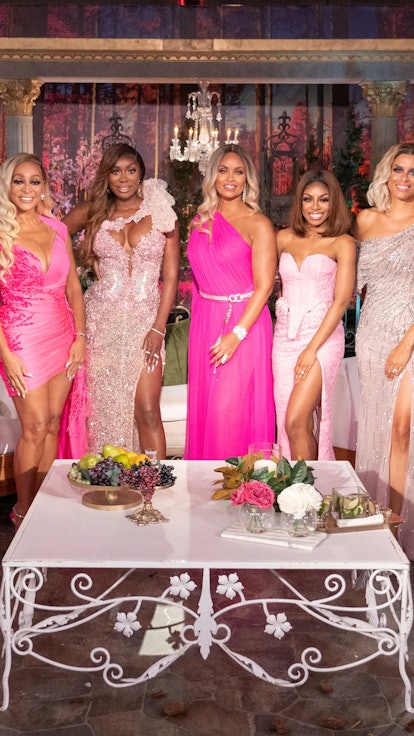Since its premiere in 2016, the Real Housewives of Potomac has gone places no other city in the franchise has. (And I’m not talking about the driveway of Gizelle’s soon-to-be-finished home.) The show continuously explores the Black experience, wealth within the Black community, Black beauty standards, and even mental health and the community’s stigma attached to it. The dynamic between the women has always given off sister vibes, which has made it more fun to watch. It can be funny, it can be light, and overall, a good comfortable watch. However, the blatant issue of colorism and double standards toward dark-skinned cast members from both the fans and some of the cast members needs to be heard.
Because the thing is, it has been brought up. It has been discussed, but it doesn’t seem to be sinking in. The topic comes up, it’s given a little space, and then it just… goes away. No one takes accountability, no one hears the other side, and we’re left in the same space we started. Over the last two seasons, we haven’t moved forward at all when it comes to acknowledging that colorism exists on and off the stage.
In Season 5, however, when Wendy Osefo had a heated moment with Ashley over not being able to bring her daughter to a lake house getaway where Ashley brought her son, Dean, Ashley called Wendy aggressive and "ferocious." The comments gained traction outside of the show and were addressed at the Season 5 reunion. While the conversation at the reunion allowed the women to address (and at least recognize, even if forced by Andy) the darker-skinned cast member’s concerns (Wendy expressed the way certain words act as dog whistles to viewers to open the floodgates for criticism towards the darker-skinned cast members), it was still a very contentious conversation. And a few months later, cast members Robyn Dixon and Gizelle Bryant went on to dismiss Candiace Dillard Basset's feelings surrounding colorism on their press tour for their podcast, saying, “It was stupid.”
Then, a year later during the Season 6 reunion, the topic was broached once again. This time, Ashley Darby said she didn’t see “any demonstrations” of colorism, and instead said that “because there are perceptions held within society, they try to project things in this group that don’t naturally exist.”
Unfortunately, the constant dismissal of darker-skinned individuals on reality TV isn’t uncommon, and it exists beyond the genre as well. According to the Geena Davis Institute, 19% of Black leading women in the last decade have a dark skin tone. In a 2019 episode of black-ish, colorism was at the forefront of the conversation when Diane was poorly lit on school picture day, angering Dre and Bow. The new (inclusive) Gossip Girl cast is notably missing its dark-skinned representation. And when it comes to casting, many dark-skinned actors are often pushed to the side in favor of light-skin actors. For example, in 2016 when Zoe Saldana was cast in the role of Nina Simone, and given prosthetics to assimilate to darker features, including widening her nose and making her skin tone darker.
Eurocentric beauty standards have always been deemed favorable in the Black community. The closer you are to assimilating to those standards, the more desirable you seem. Lighter-skinned individuals have access to more opportunity and privilege, and are often given more advantages, whether it be winning a role, evading stereotypes, or becoming a fan favorite on a reality TV show.
In the Real Housewives world, you get the advantage of not being labeled a “villain.” Gizelle and Ashley have both been known to instigate drama, season after season. People love to hate them, and they always get their flowers for bringing storylines to the show. Yet, if you look online, when Candiace brought the heat on the show, she’s dragged from back to front — a petition was even created calling for her to be removed from the show. She’s expected to be non-confrontational in her response to horrific tweets that suggest she “get’s her ass beat again” and people constantly dismiss her emotions because of her socioeconomic status growing up. She’s often laughed at or not taken seriously for crying on the series (something that does, to be fair, happen a lot), but when she is angry or confrontational in her reactions, her emotions suddenly have weight and she is labeled “aggressive.”
The more the women of Potomac ignore, or brush off, claims of colorism, the more harm is done to a greater conversation surrounding racism. Using rhetoric like “aggressive,” or “mean,” or “scary,” amplify stereotypes of dark-skinned people. And while it is great to see a historically white-washed franchise like The Real Housewives tell these authentic stories of Black women, are we doing a disservice to these communities by ignoring the downfalls within its own cast?
We need to see accountability from the cast. They hold the power to create a space for thought-provoking conversations surrounding race in a way that could transcend beyond the thinly-veiled fourth wall of reality TV into the way the Black community reacts to colorism. Potomac is one of the most popular shows with Black viewers, and the power it has to shift the conversation is enormous. If it doesn’t happen, and if those conversations aren’t done properly, I fear that there will be a divide among the women that will not only be too deep for the cast to come back from, but will send a message to those watching that the problem isn’t worth investing in.
Images: Bravo
